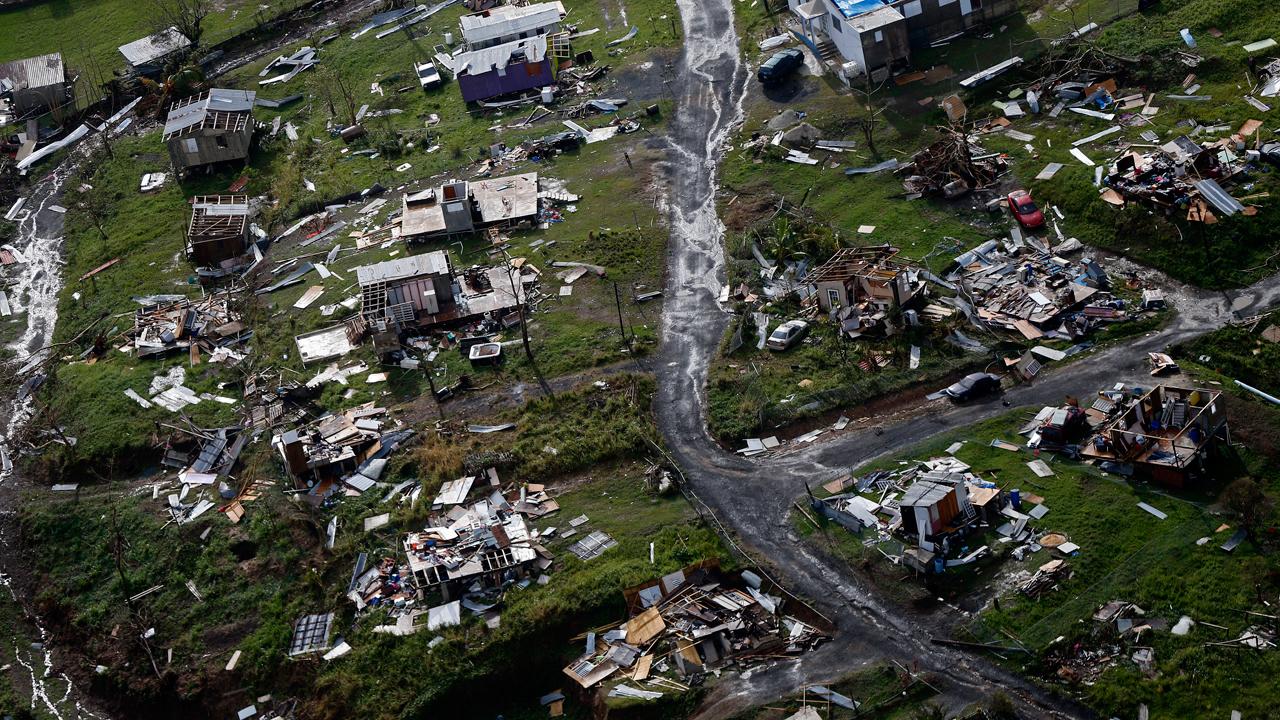Trump heads to Puerto Rico as the U.S. territory fights for more aid
President Trump is set to visit hurricane-battered Puerto Rico on Tuesday as the U.S. territory continues to hang on after surviving two powerful storms in less than a month.
Residents have been relying on relief organizations for food, shelter and clean drinking water after Hurricane Maria slammed into the island last week, whipping out power for at least six months for many.
Puerto Rico Governor Ricardo Rossello said the island was on the brink of a “humanitarian crisis,” and is urging on Trump and Congress to enact an aid bill that is consistent with other parts of the U.S. who have also suffered storm damage.
“We’ve taken aggressive economic growth initiatives for Puerto Rico, but after these two storms, particularly Maria, this has changed and we need to recognize it. We need to treat Puerto Rico equally as if we were Texas or Florida or any other state,” Rossello told FOX Business’ Maria Bartiromo on “Mornings with Maria” on Friday.
Trump, who recently waived the Jones Act last week, to enable non-American ships to deliver aid to the battered island, tweeted Friday that other “big decisions” will have to be made on rebuilding Puerto Rico next week.
Puerto Rico Governor Ricardo Rossello just stated: "The Administration and the President, every time we've spoken, they've delivered......
— Donald J. Trump (@realDonaldTrump) September 29, 2017
...The fact is that Puerto Rico has been destroyed by two hurricanes. Big decisions will have to be made as to the cost of its rebuilding!
— Donald J. Trump (@realDonaldTrump) September 29, 2017
...The fact is that Puerto Rico has been destroyed by two hurricanes. Big decisions will have to be made as to the cost of its rebuilding!
— Donald J. Trump (@realDonaldTrump) September 29, 2017
Earlier this week, Trump tweeted about the island’s broken infrastructure and massive debt, saying the country is in deep trouble.
...It's old electrical grid, which was in terrible shape, was devastated. Much of the Island was destroyed, with billions of dollars....
— Donald J. Trump (@realDonaldTrump) September 26, 2017
...owed to Wall Street and the banks which, sadly, must be dealt with. Food, water and medical are top priorities - and doing well. #FEMA
— Donald J. Trump (@realDonaldTrump) September 26, 2017
Norman Bristol Colon, special assistant to Pennsylvania’s Secretary of State, a Puerto Rican native with family currently living on the island, told FOX Business that the island desperately needs funds from the U.S. to get residents back on their feet.
“The island needs an injection of dollars to restart its economic engine and for these funds to go directly to buy what’s left of goods after the devastation of Hurricane Maria. The Port Authority needs to open its ports and airports for relief to arrive and assistance in the clean up efforts. The assistance of medical professionals is crucial to ensure that in the days to come, there is not a break of any epidemics related to flooding,” Colon said. “The infrastructure for electric, water and telephone service is priority to begin the process of normalizing government operations so services can be assessed and delivered to the thousands of individuals affected by this natural catastrophe. We need Congress and the federal government to support what is anticipated to be a long, difficult journey for the island and its citizens.”
Before the latest storm hit, the country was already suffering a 10-year recession and owed billions of dollars to investors. Earlier this year, the country filed for a form of bankruptcy after years of borrowing money to cover budget deficits. The former governor declared its $73 billion in public debt load unpayable, which has prompted an independent investigation into its financial disclosures.
Early estimates say overall damage from Hurricanes Irma and Maria will cost about $30 billion, Enki Research reported. But some economists say that while the country was already on a downward spiral before the latest catastrophes, the current devastation may actually help to loosen creditors grip on the country.
“You can’t squeeze water out a turnip,” Nobel-Prize winning economist and professor at Columbia University Joseph Eugene Stiglitz told FOX Business. “The bottom line is [Puerto Rico] is going to need a massive amount of help. Without relief from bondholders or from the federal government, they are going to continue on their downward spiral which means for the creditors that they would be better giving them more debt relief because in the future, it will have to come. They are not going to be able to repay anything back.”
Jose Antonio Ocampo, professor of Professional Practice in International and Public Affairs at Columbia University who served as Under-Secretary-General for Economic and Social Affairs at the United Nations, agreed, saying he believes the hurricanes have now “increased the proportion of debt that should be written-off.”
“All will depend on how much the U.S. supports [Puerto Rico] in the reconstruction of the major damages incurred by the island,” he told FOX Business.
Stiglitz added that not only is “a very large ‘haircut’ needed among creditors, it is imperative that the federal government give them relief and mentor it with what they are giving other parts of the country that have been also hit, like Houston.” “If they don’t get those additional funds from the government, it just means the education system—which is already being strangled—will prevent the country’s ability to return to normalcy. Anything that can be cut will be cut now,” he said.
Arthur Gonzalez, former chief judge of the U.S. Bankruptcy Court for the Southern District of New York and NYU’s Senior Fellow, told FOX Business that it’s simply “too early to tell what impact [the hurricanes] may have on [Puerto Rico’s] debt crisis.”
“The focus now is on the recovery efforts to ensure the health and safety of the people of Puerto Rico,” he said.




















